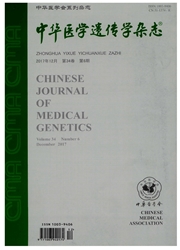

 中文摘要:
中文摘要:
近年研究发现基因转录异常可导致亨廷顿病(Huntington’s disease,HD)等多聚谷氨酰胺(polyglutamine,PolyQ)病中的神经元功能异常。组蛋白去乙酰化酶(histone deaeetylases,HDACs)作为一种转录抑制因子,可与辅阻遏物复合体相互作用导致染色质重塑,最终抑制目的基因的转录。PolyQ蛋白与基因转录调控因子异常的相互作用可能是PolyQ病转录失调的原因之一。作者就PolyQ病转录失调的可能发生机制,尤其是组蛋白乙酰转移酶(histone acetyltransferases,HATs)和HDACs在其中所起的作用,以及组蛋白去乙酰化酶抑制剂(histone deaeetylases inhibitors,HDACIs)的治疗潜能等方面予以综述。
 英文摘要:
英文摘要:
During the past few years, gene expression studies have shown that the perturbation of transcription frequently results in neuronal dysfunction in polyglutamine (PolyQ) diseases such as Huntington's disease (HD). Histone deacetylases (HDACs) act as repressors of transcription through interaction with co-repressor complexes, leading to chromatin remodelling. Aberrant interaction between PolyQ proteins and regulators of transcription could be one mechanism by which transcriptional dysregulation occurs. Here, the authors discuss the possible mechanism of transcriptional dysfunction in PolyQ disease, including the effect of histone acetyltransferases (HATs) and HDACs on pathogenesis, and the potential therapeutic pathways through which histone deacetylase inhibitors (HDACIs) might act to correct the aberrant transcription observed in HD and other PolyQ diseases.
 同期刊论文项目
同期刊论文项目
 同项目期刊论文
同项目期刊论文
 The correlation between magnetic resonance imaging features of the brainstem and cerebellum and clin
The correlation between magnetic resonance imaging features of the brainstem and cerebellum and clin A rare Von Hippel-Lindau disease that mimics acute myelitis: case report and review of the literatur
A rare Von Hippel-Lindau disease that mimics acute myelitis: case report and review of the literatur Spinocerebellar ataxia type 27 (SCA27) is an uncommon cause of dominant ataxia among Chinese Han pop
Spinocerebellar ataxia type 27 (SCA27) is an uncommon cause of dominant ataxia among Chinese Han pop 期刊信息
期刊信息
